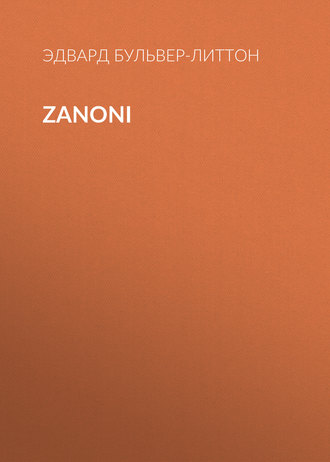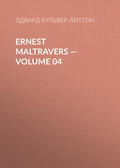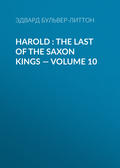
Эдвард Бульвер-Литтон
Zanoni
BOOK II. – ART, LOVE, AND WONDER
Diversi aspetti in un confusi e misti.
“Ger. Lib,” cant. iv. 7.
Different appearances, confused and mixt in one.
CHAPTER 2.I
Centauri, e Sfingi, e pallide Gorgoni.
“Ger. Lib.,” c. iv. v.
(Centaurs and Sphinxes and pallid Gorgons.)
One moonlit night, in the Gardens at Naples, some four or five gentleman were seated under a tree, drinking their sherbet, and listening, in the intervals of conversation, to the music which enlivened that gay and favourite resort of an indolent population. One of this little party was a young Englishman, who had been the life of the whole group, but who, for the last few moments, had sunk into a gloomy and abstracted reverie. One of his countrymen observed this sudden gloom, and, tapping him on the back, said, “What ails you, Glyndon? Are you ill? You have grown quite pale,—you tremble. Is it a sudden chill? You had better go home: these Italian nights are often dangerous to our English constitutions.”
“No, I am well now; it was a passing shudder. I cannot account for it myself.”
A man, apparently of about thirty years of age, and of a mien and countenance strikingly superior to those around him, turned abruptly, and looked steadfastly at Glyndon.
“I think I understand what you mean,” said he; “and perhaps,” he added, with a grave smile, “I could explain it better than yourself.” Here, turning to the others, he added, “You must often have felt, gentlemen, each and all of you, especially when sitting alone at night, a strange and unaccountable sensation of coldness and awe creep over you; your blood curdles, and the heart stands still; the limbs shiver; the hair bristles; you are afraid to look up, to turn your eyes to the darker corners of the room; you have a horrible fancy that something unearthly is at hand; presently the whole spell, if I may so call it, passes away, and you are ready to laugh at your own weakness. Have you not often felt what I have thus imperfectly described?—if so, you can understand what our young friend has just experienced, even amidst the delights of this magical scene, and amidst the balmy whispers of a July night.”
“Sir,” replied Glyndon, evidently much surprised, “you have defined exactly the nature of that shudder which came over me. But how could my manner be so faithful an index to my impressions?”
“I know the signs of the visitation,” returned the stranger, gravely; “they are not to be mistaken by one of my experience.”
All the gentleman present then declared that they could comprehend, and had felt, what the stranger had described.
“According to one of our national superstitions,” said Mervale, the Englishman who had first addressed Glyndon, “the moment you so feel your blood creep, and your hair stand on end, some one is walking over the spot which shall be your grave.”
“There are in all lands different superstitions to account for so common an occurrence,” replied the stranger: “one sect among the Arabians holds that at that instant God is deciding the hour either of your death, or of some one dear to you. The African savage, whose imagination is darkened by the hideous rites of his gloomy idolatry, believes that the Evil Spirit is pulling you towards him by the hair: so do the Grotesque and the Terrible mingle with each other.”
“It is evidently a mere physical accident,—a derangement of the stomach, a chill of the blood,” said a young Neapolitan, with whom Glyndon had formed a slight acquaintance.
“Then why is it always coupled in all nations with some superstitious presentiment or terror,—some connection between the material frame and the supposed world without us? For my part, I think—”
“Ay, what do you think, sir?” asked Glyndon, curiously.
“I think,” continued the stranger, “that it is the repugnance and horror with which our more human elements recoil from something, indeed, invisible, but antipathetic to our own nature; and from a knowledge of which we are happily secured by the imperfection of our senses.”
“You are a believer in spirits, then?” said Mervale, with an incredulous smile.
“Nay, it was not precisely of spirits that I spoke; but there may be forms of matter as invisible and impalpable to us as the animalculae in the air we breathe,—in the water that plays in yonder basin. Such beings may have passions and powers like our own—as the animalculae to which I have compared them. The monster that lives and dies in a drop of water—carnivorous, insatiable, subsisting on the creatures minuter than himself—is not less deadly in his wrath, less ferocious in his nature, than the tiger of the desert. There may be things around us that would be dangerous and hostile to men, if Providence had not placed a wall between them and us, merely by different modifications of matter.”
“And think you that wall never can be removed?” asked young Glyndon, abruptly. “Are the traditions of sorcerer and wizard, universal and immemorial as they are, merely fables?”
“Perhaps yes,—perhaps no,” answered the stranger, indifferently. “But who, in an age in which the reason has chosen its proper bounds, would be mad enough to break the partition that divides him from the boa and the lion,—to repine at and rebel against the law which confines the shark to the great deep? Enough of these idle speculations.”
Here the stranger rose, summoned the attendant, paid for his sherbet, and, bowing slightly to the company, soon disappeared among the trees.
“Who is that gentleman?” asked Glyndon, eagerly.
The rest looked at each other, without replying, for some moments.
“I never saw him before,” said Mervale, at last.
“Nor I.”
“Nor I.”
“I know him well,” said the Neapolitan, who was, indeed, the Count Cetoxa. “If you remember, it was as my companion that he joined you. He visited Naples about two years ago, and has recently returned; he is very rich,—indeed, enormously so. A most agreeable person. I am sorry to hear him talk so strangely to-night; it serves to encourage the various foolish reports that are circulated concerning him.”
“And surely,” said another Neapolitan, “the circumstance that occurred but the other day, so well known to yourself, Cetoxa, justifies the reports you pretend to deprecate.”
“Myself and my countryman,” said Glyndon, “mix so little in Neapolitan society, that we lose much that appears well worthy of lively interest. May I enquire what are the reports, and what is the circumstance you refer to?”
“As to the reports, gentlemen,” said Cetoxa, courteously, addressing himself to the two Englishmen, “it may suffice to observe, that they attribute to the Signor Zanoni certain qualities which everybody desires for himself, but damns any one else for possessing. The incident Signor Belgioso alludes to, illustrates these qualities, and is, I must own, somewhat startling. You probably play, gentlemen?” (Here Cetoxa paused; and as both Englishmen had occasionally staked a few scudi at the public gaming-tables, they bowed assent to the conjecture.) Cetoxa continued. “Well, then, not many days since, and on the very day that Zanoni returned to Naples, it so happened that I had been playing pretty high, and had lost considerably. I rose from the table, resolved no longer to tempt fortune, when I suddenly perceived Zanoni, whose acquaintance I had before made (and who, I may say, was under some slight obligation to me), standing by, a spectator. Ere I could express my gratification at this unexpected recognition, he laid his hand on my arm. ‘You have lost much,’ said he; ‘more than you can afford. For my part, I dislike play; yet I wish to have some interest in what is going on. Will you play this sum for me? the risk is mine,—the half profits yours.’ I was startled, as you may suppose, at such an address; but Zanoni had an air and tone with him it was impossible to resist; besides, I was burning to recover my losses, and should not have risen had I had any money left about me. I told him I would accept his offer, provided we shared the risk as well as profits. ‘As you will,’ said he, smiling; ‘we need have no scruple, for you will be sure to win.’ I sat down; Zanoni stood behind me; my luck rose,—I invariably won. In fact, I rose from the table a rich man.”
“There can be no foul play at the public tables, especially when foul play would make against the bank?” This question was put by Glyndon.
“Certainly not,” replied the count. “But our good fortune was, indeed, marvellous,—so extraordinary that a Sicilian (the Sicilians are all ill-bred, bad-tempered fellows) grew angry and insolent. ‘Sir,’ said he, turning to my new friend, ‘you have no business to stand so near to the table. I do not understand this; you have not acted fairly.’ Zanoni replied, with great composure, that he had done nothing against the rules,—that he was very sorry that one man could not win without another man losing; and that he could not act unfairly, even if disposed to do so. The Sicilian took the stranger’s mildness for apprehension, and blustered more loudly. In fact, he rose from the table, and confronted Zanoni in a manner that, to say the least of it, was provoking to any gentleman who has some quickness of temper, or some skill with the small-sword.”
“And,” interrupted Belgioso, “the most singular part of the whole to me was, that this Zanoni, who stood opposite to where I sat, and whose face I distinctly saw, made no remark, showed no resentment. He fixed his eyes steadfastly on the Sicilian; never shall I forget that look! it is impossible to describe it,—it froze the blood in my veins. The Sicilian staggered back as if struck. I saw him tremble; he sank on the bench. And then—”
“Yes, then,” said Cetoxa, “to my infinite surprise, our gentleman, thus disarmed by a look from Zanoni, turned his whole anger upon me, THE—but perhaps you do not know, gentlemen, that I have some repute with my weapon?”
“The best swordsman in Italy,” said Belgioso.
“Before I could guess why or wherefore,” resumed Cetoxa, “I found myself in the garden behind the house, with Ughelli (that was the Sicilian’s name) facing me, and five or six gentlemen, the witnesses of the duel about to take place, around. Zanoni beckoned me aside. ‘This man will fall,’ said he. ‘When he is on the ground, go to him, and ask whether he will be buried by the side of his father in the church of San Gennaro?’ ‘Do you then know his family?’ I asked with great surprise. Zanoni made me no answer, and the next moment I was engaged with the Sicilian. To do him justice, his imbrogliato was magnificent, and a swifter lounger never crossed a sword; nevertheless,” added Cetoxa, with a pleasing modesty, “he was run through the body. I went up to him; he could scarcely speak. ‘Have you any request to make,—any affairs to settle?’ He shook his head. ‘Where would you wish to be interred?’ He pointed towards the Sicilian coast. ‘What!’ said I, in surprise, ‘NOT by the side of your father, in the church of San Gennaro?’ As I spoke, his face altered terribly; he uttered a piercing shriek,—the blood gushed from his mouth, and he fell dead. The most strange part of the story is to come. We buried him in the church of San Gennaro. In doing so, we took up his father’s coffin; the lid came off in moving it, and the skeleton was visible. In the hollow of the skull we found a very slender wire of sharp steel; this caused surprise and inquiry. The father, who was rich and a miser, had died suddenly, and been buried in haste, owing, it was said, to the heat of the weather. Suspicion once awakened, the examination became minute. The old man’s servant was questioned, and at last confessed that the son had murdered the sire. The contrivance was ingenious: the wire was so slender that it pierced to the brain, and drew but one drop of blood, which the grey hairs concealed. The accomplice will be executed.”
“And Zanoni,—did he give evidence, did he account for—”
“No,” interrupted the count: “he declared that he had by accident visited the church that morning; that he had observed the tombstone of the Count Ughelli; that his guide had told him the count’s son was in Naples,—a spendthrift and a gambler. While we were at play, he had heard the count mentioned by name at the table; and when the challenge was given and accepted, it had occurred to him to name the place of burial, by an instinct which he either could not or would not account for.”
“A very lame story,” said Mervale.
“Yes! but we Italians are superstitious,—the alleged instinct was regarded by many as the whisper of Providence. The next day the stranger became an object of universal interest and curiosity. His wealth, his manner of living, his extraordinary personal beauty, have assisted also to make him the rage; besides, I have had the pleasure in introducing so eminent a person to our gayest cavaliers and our fairest ladies.”
“A most interesting narrative,” said Mervale, rising. “Come, Glyndon; shall we seek our hotel? It is almost daylight. Adieu, signor!”
“What think you of this story?” said Glyndon, as the young men walked homeward.
“Why, it is very clear that this Zanoni is some imposter,—some clever rogue; and the Neapolitan shares the booty, and puffs him off with all the hackneyed charlatanism of the marvellous. An unknown adventurer gets into society by being made an object of awe and curiosity; he is more than ordinarily handsome, and the women are quite content to receive him without any other recommendation than his own face and Cetoxa’s fables.”
“I cannot agree with you. Cetoxa, though a gambler and a rake, is a nobleman of birth and high repute for courage and honour. Besides, this stranger, with his noble presence and lofty air,—so calm, so unobtrusive,—has nothing in common with the forward garrulity of an imposter.”
“My dear Glyndon, pardon me; but you have not yet acquired any knowledge of the world! The stranger makes the best of a fine person, and his grand air is but a trick of the trade. But to change the subject,—how advances the love affair?”
“Oh, Viola could not see me to-day.”
“You must not marry her. What would they all say at home?”
“Let us enjoy the present,” said Glyndon, with vivacity; “we are young, rich, good-looking; let us not think of to-morrow.”
“Bravo, Glyndon! Here we are at the hotel. Sleep sound, and don’t dream of Signor Zanoni.”
CHAPTER 2.II
Prende, giovine audace e impaziente,
L’occasione offerta avidamente.
“Ger. Lib.,” c. vi. xxix.
(Take, youth, bold and impatient, the offered occasion eagerly.)
Clarence Glyndon was a young man of fortune, not large, but easy and independent. His parents were dead, and his nearest relation was an only sister, left in England under the care of her aunt, and many years younger than himself. Early in life he had evinced considerable promise in the art of painting, and rather from enthusiasm than any pecuniary necessity for a profession, he determined to devote himself to a career in which the English artist generally commences with rapture and historical composition, to conclude with avaricious calculation and portraits of Alderman Simpkins. Glyndon was supposed by his friends to possess no inconsiderable genius; but it was of a rash and presumptuous order. He was averse from continuous and steady labour, and his ambition rather sought to gather the fruit than to plant the tree. In common with many artists in their youth, he was fond of pleasure and excitement, yielding with little forethought to whatever impressed his fancy or appealed to his passions. He had travelled through the more celebrated cities of Europe, with the avowed purpose and sincere resolution of studying the divine masterpieces of his art. But in each, pleasure had too often allured him from ambition, and living beauty distracted his worship from the senseless canvas. Brave, adventurous, vain, restless, inquisitive, he was ever involved in wild projects and pleasant dangers,—the creature of impulse and the slave of imagination.
It was then the period when a feverish spirit of change was working its way to that hideous mockery of human aspirations, the Revolution of France; and from the chaos into which were already jarring the sanctities of the World’s Venerable Belief, arose many shapeless and unformed chimeras. Need I remind the reader that, while that was the day for polished scepticism and affected wisdom, it was the day also for the most egregious credulity and the most mystical superstitions,—the day in which magnetism and magic found converts amongst the disciples of Diderot; when prophecies were current in every mouth; when the salon of a philosophical deist was converted into an Heraclea, in which necromancy professed to conjure up the shadows of the dead; when the Crosier and the Book were ridiculed, and Mesmer and Cagliostro were believed. In that Heliacal Rising, heralding the new sun before which all vapours were to vanish, stalked from their graves in the feudal ages all the phantoms that had flitted before the eyes of Paracelsus and Agrippa. Dazzled by the dawn of the Revolution, Glyndon was yet more attracted by its strange accompaniments; and natural it was with him, as with others, that the fancy which ran riot amidst the hopes of a social Utopia, should grasp with avidity all that promised, out of the dusty tracks of the beaten science, the bold discoveries of some marvellous Elysium.
In his travels he had listened with vivid interest, at least, if not with implicit belief, to the wonders told of each more renowned Ghost-seer, and his mind was therefore prepared for the impression which the mysterious Zanoni at first sight had produced upon it.
There might be another cause for this disposition to credulity. A remote ancestor of Glyndon’s on the mother’s side, had achieved no inconsiderable reputation as a philosopher and alchemist. Strange stories were afloat concerning this wise progenitor. He was said to have lived to an age far exceeding the allotted boundaries of mortal existence, and to have preserved to the last the appearance of middle life. He had died at length, it was supposed, of grief for the sudden death of a great-grandchild, the only creature he had ever appeared to love. The works of this philosopher, though rare, were extant, and found in the library of Glyndon’s home. Their Platonic mysticism, their bold assertions, the high promises that might be detected through their figurative and typical phraseology, had early made a deep impression on the young imagination of Clarence Glyndon. His parents, not alive to the consequences of encouraging fancies which the very enlightenment of the age appeared to them sufficient to prevent or dispel, were fond, in the long winter nights, of conversing on the traditional history of this distinguished progenitor. And Clarence thrilled with a fearful pleasure when his mother playfully detected a striking likeness between the features of the young heir and the faded portrait of the alchemist that overhung their mantelpiece, and was the boast of their household and the admiration of their friends,—the child is, indeed, more often than we think for, “the father of the man.”
I have said that Glyndon was fond of pleasure. Facile, as genius ever must be, to cheerful impression, his careless artist-life, ere artist-life settles down to labour, had wandered from flower to flower. He had enjoyed, almost to the reaction of satiety, the gay revelries of Naples, when he fell in love with the face and voice of Viola Pisani. But his love, like his ambition, was vague and desultory. It did not satisfy his whole heart and fill up his whole nature; not from want of strong and noble passions, but because his mind was not yet matured and settled enough for their development. As there is one season for the blossom, another for the fruit; so it is not till the bloom of fancy begins to fade, that the heart ripens to the passions that the bloom precedes and foretells. Joyous alike at his lonely easel or amidst his boon companions, he had not yet known enough of sorrow to love deeply. For man must be disappointed with the lesser things of life before he can comprehend the full value of the greatest. It is the shallow sensualists of France, who, in their salon-language, call love “a folly,”—love, better understood, is wisdom. Besides, the world was too much with Clarence Glyndon. His ambition of art was associated with the applause and estimation of that miserable minority of the surface that we call the Public.
Like those who deceive, he was ever fearful of being himself the dupe. He distrusted the sweet innocence of Viola. He could not venture the hazard of seriously proposing marriage to an Italian actress; but the modest dignity of the girl, and something good and generous in his own nature, had hitherto made him shrink from any more worldly but less honourable designs. Thus the familiarity between them seemed rather that of kindness and regard than passion. He attended the theatre; he stole behind the scenes to converse with her; he filled his portfolio with countless sketches of a beauty that charmed him as an artist as well as lover; and day after day he floated on through a changing sea of doubt and irresolution, of affection and distrust. The last, indeed, constantly sustained against his better reason by the sober admonitions of Mervale, a matter-of-fact man!
The day following that eve on which this section of my story opens, Glyndon was riding alone by the shores of the Neapolitan sea, on the other side of the Cavern of Posilipo. It was past noon; the sun had lost its early fervour, and a cool breeze sprung up voluptuously from the sparkling sea. Bending over a fragment of stone near the roadside, he perceived the form of a man; and when he approached, he recognised Zanoni.
The Englishman saluted him courteously. “Have you discovered some antique?” said he, with a smile; “they are common as pebbles on this road.”
“No,” replied Zanoni; “it was but one of those antiques that have their date, indeed, from the beginning of the world, but which Nature eternally withers and renews.” So saying, he showed Glyndon a small herb with a pale-blue flower, and then placed it carefully in his bosom.
“You are an herbalist?”
“I am.”
“It is, I am told, a study full of interest.”
“To those who understand it, doubtless.”
“Is the knowledge, then, so rare?”
“Rare! The deeper knowledge is perhaps rather, among the arts, LOST to the modern philosophy of commonplace and surface! Do you imagine there was no foundation for those traditions which come dimly down from remoter ages,—as shells now found on the mountain-tops inform us where the seas have been? What was the old Colchian magic, but the minute study of Nature in her lowliest works? What the fable of Medea, but a proof of the powers that may be extracted from the germ and leaf? The most gifted of all the Priestcrafts, the mysterious sisterhoods of Cuth, concerning whose incantations Learning vainly bewilders itself amidst the maze of legends, sought in the meanest herbs what, perhaps, the Babylonian Sages explored in vain amidst the loftiest stars. Tradition yet tells you that there existed a race (“Plut. Symp.” l. 5. c. 7.) who could slay their enemies from afar, without weapon, without movement. The herb that ye tread on may have deadlier powers than your engineers can give to their mightiest instruments of war. Can you guess that to these Italian shores, to the old Circaean Promontory, came the Wise from the farthest East, to search for plants and simples which your Pharmacists of the Counter would fling from them as weeds? The first herbalists—the master chemists of the world—were the tribe that the ancient reverence called by the name of Titans. (Syncellus, page 14.—“Chemistry the Invention of the Giants.”) I remember once, by the Hebrus, in the reign of – But this talk,” said Zanoni, checking himself abruptly, and with a cold smile, “serves only to waste your time and my own.” He paused, looked steadily at Glyndon, and continued, “Young man, think you that vague curiosity will supply the place of earnest labour? I read your heart. You wish to know me, and not this humble herb: but pass on; your desire cannot be satisfied.”
“You have not the politeness of your countrymen,” said Glyndon, somewhat discomposed. “Suppose I were desirous to cultivate your acquaintance, why should you reject my advances?”
“I reject no man’s advances,” answered Zanoni; “I must know them if they so desire; but ME, in return, they can never comprehend. If you ask my acquaintance, it is yours; but I would warn you to shun me.”
“And why are you, then, so dangerous?”
“On this earth, men are often, without their own agency, fated to be dangerous to others. If I were to predict your fortune by the vain calculations of the astrologer, I should tell you, in their despicable jargon, that my planet sat darkly in your house of life. Cross me not, if you can avoid it. I warn you now for the first time and last.”
“You despise the astrologers, yet you utter a jargon as mysterious as theirs. I neither gamble nor quarrel; why, then, should I fear you?”
“As you will; I have done.”
“Let me speak frankly,—your conversation last night interested and perplexed me.”
“I know it: minds like yours are attracted by mystery.”
Glyndon was piqued at these words, though in the tone in which they were spoken there was no contempt.
“I see you do not consider me worthy of your friendship. Be it so. Good-day!”
Zanoni coldly replied to the salutation; and as the Englishman rode on, returned to his botanical employment.
The same night, Glyndon went, as usual, to the theatre. He was standing behind the scenes watching Viola, who was on the stage in one of her most brilliant parts. The house resounded with applause. Glyndon was transported with a young man’s passion and a young man’s pride: “This glorious creature,” thought he, “may yet be mine.”
He felt, while thus wrapped in delicious reverie, a slight touch upon his shoulder; he turned, and beheld Zanoni. “You are in danger,” said the latter. “Do not walk home to-night; or if you do, go not alone.”
Before Glyndon recovered from his surprise, Zanoni disappeared; and when the Englishman saw him again, he was in the box of one of the Neapolitan nobles, where Glyndon could not follow him.
Viola now left the stage, and Glyndon accosted her with an unaccustomed warmth of gallantry. But Viola, contrary to her gentle habit, turned with an evident impatience from the address of her lover. Taking aside Gionetta, who was her constant attendant at the theatre, she said, in an earnest whisper,—
“Oh, Gionetta! He is here again!—the stranger of whom I spoke to thee!—and again, he alone, of the whole theatre, withholds from me his applause.”
“Which is he, my darling?” said the old woman, with fondness in her voice. “He must indeed be dull—not worth a thought.”
The actress drew Gionetta nearer to the stage, and pointed out to her a man in one of the boxes, conspicuous amongst all else by the simplicity of his dress, and the extraordinary beauty of his features.
“Not worth a thought, Gionetta!” repeated Viola,—“Not worth a thought! Alas, not to think of him, seems the absence of thought itself!”
The prompter summoned the Signora Pisani. “Find out his name, Gionetta,” said she, moving slowly to the stage, and passing by Glyndon, who gazed at her with a look of sorrowful reproach.
The scene on which the actress now entered was that of the final catastrophe, wherein all her remarkable powers of voice and art were pre-eminently called forth. The house hung on every word with breathless worship; but the eyes of Viola sought only those of one calm and unmoved spectator; she exerted herself as if inspired. Zanoni listened, and observed her with an attentive gaze, but no approval escaped his lips; no emotion changed the expression of his cold and half-disdainful aspect. Viola, who was in the character of one who loved, but without return, never felt so acutely the part she played. Her tears were truthful; her passion that of nature: it was almost too terrible to behold. She was borne from the stage exhausted and insensible, amidst such a tempest of admiring rapture as Continental audiences alone can raise. The crowd stood up, handkerchiefs waved, garlands and flowers were thrown on the stage,—men wiped their eyes, and women sobbed aloud.
“By heavens!” said a Neapolitan of great rank, “She has fired me beyond endurance. To-night—this very night—she shall be mine! You have arranged all, Mascari?”
“All, signor. And the young Englishman?”
“The presuming barbarian! As I before told thee, let him bleed for his folly. I will have no rival.”
“But an Englishman! There is always a search after the bodies of the English.”
“Fool! is not the sea deep enough, or the earth secret enough, to hide one dead man? Our ruffians are silent as the grave itself; and I!—who would dare to suspect, to arraign the Prince di —? See to it,—this night. I trust him to you. Robbers murder him, you understand,—the country swarms with them; plunder and strip him, the better to favour such report. Take three men; the rest shall be my escort.”
Mascari shrugged his shoulders, and bowed submissively.
The streets of Naples were not then so safe as now, and carriages were both less expensive and more necessary. The vehicle which was regularly engaged by the young actress was not to be found. Gionetta, too aware of the beauty of her mistress and the number of her admirers to contemplate without alarm the idea of their return on foot, communicated her distress to Glyndon, and he besought Viola, who recovered but slowly, to accept his own carriage. Perhaps before that night she would not have rejected so slight a service. Now, for some reason or other, she refused. Glyndon, offended, was retiring sullenly, when Gionetta stopped him. “Stay, signor,” said she, coaxingly: “the dear signora is not well,—do not be angry with her; I will make her accept your offer.”
Glyndon stayed, and after a few moments spent in expostulation on the part of Gionetta, and resistance on that of Viola, the offer was accepted. Gionetta and her charge entered the carriage, and Glyndon was left at the door of the theatre to return home on foot. The mysterious warning of Zanoni then suddenly occurred to him; he had forgotten it in the interest of his lover’s quarrel with Viola. He thought it now advisable to guard against danger foretold by lips so mysterious. He looked round for some one he knew: the theatre was disgorging its crowds; they hustled, and jostled, and pressed upon him; but he recognised no familiar countenance. While pausing irresolute, he heard Mervale’s voice calling on him, and, to his great relief, discovered his friend making his way through the throng.







